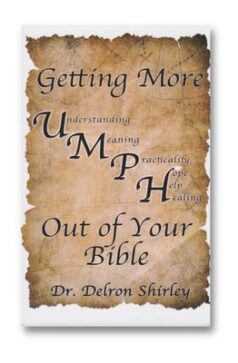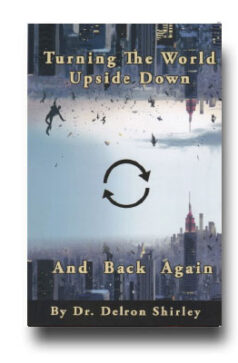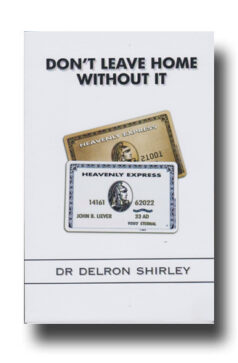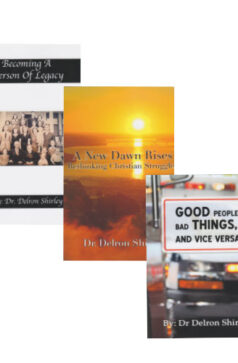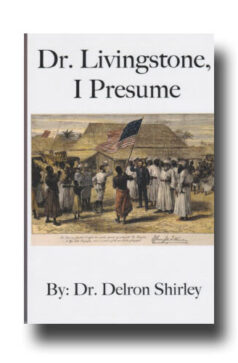In recent times, the parable of the sower has become almost exclusively associated with the principle of financial giving and receiving; however, I’d like to revisit that basic passage long enough to rethink some of its foundational truths.
First of all, let’s notice that Jesus specifically said that the sower was sowing the Word. Although it is not out of place to apply the truths in this parable to the financial realm, in its original context Jesus was not talking about money. Rather, He was telling us that if we were able to receive the Word of God properly, we would see it become productive and multiply inside us — a principle that was eloquently expressed to Joshua as he was directed to step into the leadership of Israel at the death of Moses. “This book of the law shall not depart out of thy mouth; but thou shalt meditate therein day and night, that thou mayest observe to do according to all that is written therein: for then thou shalt make thy way prosperous, and then thou shalt have good success.” (Joshua 1:8)
Through this picture story, Jesus was also declaring that it is possible for the Word to be sown into lives in which there is no increase or positive response — a principle illustrated in the lives of people with whom Joshua had just wasted the previous forty years of his life. “Let us therefore fear, lest, a promise being left us of entering into his rest, any of you should seem to come short of it. For unto us was the gospel preached, as well as unto them: but the word preached did not profit them, not being mixed with faith in them that heard it.” (Hebrews 4:1-2)
Jesus began this teaching by talking about seed that fell on the wayside, where the soil had been hardened by the constant pounding of foot traffic and the grinding of cartwheels. Every time I read this passage, I think of a line from a secular song, “These boots are made for walking, and one of these days these boots are going to walk all over you.” Unfortunately, it is a universal reality that we all have people who walk all over us. Many times, they leave behind such deep bruises and scars that our hearts become just as hardened and unproductive as that soil along the roadbed. Solomon described the trauma of personal offense as “a wounded spirit that no one can bear.” (Proverbs 18:14)
In His prophetic discourse on the Mount of Olives, Jesus listed offenses as a sign of the end times, “Then shall many be offended, and shall betray one another, and shall hate one another.” (Matthew 24:10) In Luke 17:1, Jesus gave us explicit instructions to be prepared for offenses; in fact, He forearmed us with the knowledge that it would be impossible to live above being offended, “It is impossible but that offences will come!” However, He didn’t stop with just a warning; He proclaimed that He had come to heal us from those injuries we have suffered at the heels of others. “The Spirit of the Lord is upon me, because he hath anointed me to preach the gospel to the poor; he hath sent me to heal the brokenhearted, to preach deliverance to the captives, and recovering of sight to the blind, to set at liberty them that are bruised.” (Luke 4:18) He also gave us the key to overcoming these offenses. “Love your enemies, bless them that curse you, do good to them that hate you, and pray for them which despitefully use you, and persecute you.” (Matthew 5:44) Then He demonstrated this love in action for us at the most intense moment of offense in the history of the human race — His own crucifixion — when He looked up to the heavens and prayed, “Father, forgive them; for they know not what they do.” (Luke 23:34)
If we want the Word of God to be effective in our lives, we must first determine that we will not allow our hearts to be hardened by the offenses of others. Rather, we must determine to be pro-active through forgiving those who offend us — whether intentionally or unintentionally. The principle of forgiveness is such a powerful tool that it is the only point in the Lord’s Prayer that Jesus reiterated, “For if ye forgive men their trespasses, your heavenly Father will also forgive you: But if ye forgive not men their trespasses, neither will your Father forgive your trespasses.” (Matthew 6:14-15) He also insisted that without forgiveness we should not expect answers to our prayers, “When ye stand praying, forgive, if ye have ought against any: that your Father also which is in heaven may forgive you your trespasses. But if ye do not forgive, neither will your Father which is in heaven forgive your trespasses.” (Luke 11:25-26) In addition, He demanded forgiveness even before making offerings to the Lord, “If thou bring thy gift to the altar, and there rememberest that thy brother hath ought against thee; Leave there thy gift before the altar, and go thy way; first be reconciled to thy brother, and then come and offer thy gift.” (Matthew 5:23-24)
Next, Jesus turned His attention to the stony soil that seems to represent the natural obstacles that occur in our lives. Certainly, it is possible that our enemies might scatter stones in the fields of our lives; this has been practiced by invading armies in an attempt to cripple the productivity of the subdued peoples. However, the vast majority of stones that we encounter in our lives are natural occurrences — obstacles that are common to all men. Because these stones represent deterrents that are part of the universal human experience, we find it all too easy to make excuses for them: “I’m only human,” “It’s only natural,” “Everybody else is doing it,” or “It’s nothing the next guy wouldn’t do.” The parable points out that we are dooming our spiritual productivity every time we make such an excuse for our shortcomings rather than obeying the scriptural mandate to dig them up and drag them out of our lives like we do the stones in our cultivated fields. The born-again person who has not advanced to become a disciplined follower of Christ remains a shallow Christian because he allows these obstacles to remain in his life. When the Apostle Paul described the stone removal process, he used the term “old man” to emphasize our natural attitudes and actions — the things we so easily excuse as “just being human.” “Put off concerning the former conversation the old man, which is corrupt according to the deceitful lusts.” (Ephesians 4:22) “Lie not one to another, seeing that ye have put off the old man with his deeds.” (Colossians 3:9) His solution to the problem of the old man is to mortify him and bury the corpse in baptism.
If ye live after the flesh, ye shall die: but if ye through the Spirit do mortify the deeds of the body, ye shall live. (Romans 8:13)
Mortify therefore your members which are upon the earth; fornication, uncleanness, inordinate affection, evil concupiscence, and covetousness, which is idolatry. (Colossians 3:5)
Therefore we are buried with him by baptism into death: that like as Christ was raised up from the dead by the glory of the Father, even so we also should walk in newness of life. (Romans 6:4)
Buried with him in baptism, wherein also ye are risen with him through the faith of the operation of God, who hath raised him from the dead. (Colossians 2:12)
The result will be that we will be able to say that we are no longer the ones who are actually living our lives, but Christ is living through us. (Galatians 2:20) Until we come to that place, our lives will be shallow and unproductive. To ensure that our hearts are not the stony ground that hinders the growth of the Word of God in our lives, we must forfeit all rights to hold on to our natural carnal weaknesses and flaws.
Now, Jesus turns to the issue of the field that was infested with thorns. Although our minds might immediately flash to the story of the enemy who sowed tares in his neighbor’s field in an attempt to destroy his wheat harvest, we should be aware that this kind of sabotage occurs such a small percentage of the time that we must consider it statistically insignificant. To find the origin of the thorn-and-thistle problem, we must go all the way back to Adam and Eve’s expulsion from the Garden of Eden when God imposed an infestation of weeds as man’s punishment for his disobedience. The weeds seem to represent the difficulties that come into our lives because of our own willful sin and deliberate disobedience — things that we bring upon ourselves. I’ve often joked that the way we can tell the difference between the weeds that we are supposed to pull out of our flowerbeds and the plants that are supposed to be left intact is that the ones that come out easily are the ones that should be left while the ones that are difficult to extract are the weeds. I believe that this humorous little definition is especially true in the spiritual realm. Jesus enumerated these weeds as the cares of life, the deceitfulness of riches, and the lust of other things. Each of these conditions fits perfectly with James’ description of sin’s downward spiral, “Every man is tempted, when he is drawn away of his own lust, and enticed. Then when lust hath conceived, it bringeth forth sin: and sin, when it is finished, bringeth forth death.” (James 1:14-15) The concerns of daily living can draw our attention so far away from a focused relationship with God that we actually forget Him. The cure is to draw closer to Him rather than further from Him in the face of life’s adversities. Peter counseled us to cast all our cares upon Jesus because He cares for us. (I Peter 5:7)
Concerning the deceitfulness of riches, we all know the expression “Money talks,” but do we really realize that it does talk to us all the time? The unfortunate thing is that it is a liar! It is always trying to deceive us into believing its pretensions. When Jesus gave us this parable, he had apparently heard His money declare some of the same things that my money boasts to me:
“You need me.”
“I’m your security.”
“I’m important to you.”
“You can’t make it without me.”
“Be careful with me; I’m all you have.”
“Watch out for me; I’ll be there when you need me.”
These are all the promises of a close and loyal friend; unfortunately, money is not our bosom buddy. In Luke 12:16-21, Jesus told the story of a certain successful farmer who had more than enough money to meet all his personal needs for the rest of his life, but he began to hear that money speaking to him some of the same deceptive lines we’ve heard our money say to us. His money convinced him that there was security in wealth, but God broke into the gentleman’s deluded little world with the harsh reality that his money would do him no good where he was headed that very night — the grave. To keep the weeds of money’s deception from ensnaring us, we must remember one basic principle: it’s okay to have money, but we must be careful not to be had by it.
John, the beloved disciple, wrote to us about our lusts or desires for earthly things, “All that is in the world, the lust of the flesh, and the lust of the eyes, and the pride of life, is not of the Father, but is of the world.” (I John 2:16) Recognizing that these are things that pull us away from — rather than toward — our Savior, we must determine to focus our lives totally on Him so that there is no place for the allurement of this world’s Siren call. “Thou shalt love the Lord thy God with all thy heart, and with all thy soul, and with all thy mind, and with all thy strength: this is the first commandment.” (Mark 12:30)
When these temptations present themselves, our response should be the words of Christ Himself in Luke 4:8, “Get thee behind me, Satan: for it is written, Thou shalt worship the Lord thy God, and him only shalt thou serve.” In order to live weed-free lives, we must force ourselves beyond the temptations of life to the Christ who waits with open arms to forgive, restore, and empower us.
Finally, Jesus came to the productive soil that had been tilled, weeded, watered, fertilized, and was ready to receive the seed. According to the Old Testament commandments that were enforced at the time of Jesus, the land had also been allowed to rest and rejuvenate one year out of every seven. Furthermore, since this field likely belonged to an observant follower of the commandments, it was under the divine blessing of God. “The LORD shall make thee plenteous in goods, in the fruit of thy body, and in the fruit of thy cattle, and in the fruit of thy ground, in the land which the LORD sware unto thy fathers to give thee.” (Deuteronomy 28:11) To sum up the case of the good soil, we can simply say that if we foster the life of Christ inside ourselves and follow after Christ and godliness, we will reap God’s multiplied blessings. Although God’s promise to Joshua that we read earlier in this discussion condenses the whole argument into just a few lines; the prophet Micah assists us further by categorizing the major obligations of a godly life, “He hath shewed thee, O man, what is good; and what doth the LORD require of thee, but to do justly, and to love mercy, and to walk humbly with thy God.” (Micah 6:8) Jesus narrowed the commandments even further, “Thou shalt love the Lord thy God with all thy heart, and with all thy soul, and with all thy mind, and with all thy strength: this is the first commandment. The second is like, namely this, Thou shalt love thy neighbour as thyself. There is none other commandment greater than these.” (Mark 12:30-31) The good, productive soil is the heart of those who not only live by these commandments but who have Christ alive in them and living through them. “It is God which worketh in you both to will and to do of his good pleasure.” (Philippians 2:13)
One important point that we cannot fail to consider while we are revisiting this familiar parable is the harvest. Since we determined that the seed sown was not — as we so often assume — money, then what is the nature of the harvest? The biblical principle established at creation and repeated numerous times in Genesis, Leviticus, and Deuteronomy is that everything reproduces after its own kind. Therefore, if it is the Word of God that was sown, then it is the Word of God that is going to be reaped. When the Word of God is accepted into a ready heart, it begins to multiply, resulting in deeper revelation and further insight into other principles from the Word. This is why Jesus questioned the disciples as to how they would understand His other teachings if they didn’t understand this one. “Know ye not this parable? and how then will ye know all parables?” (Mark 4:13)
At the same time, we must also remember another biblical principle that Paul set forth in his discussion on the resurrection — there can be a change, a metamorphosis, between the time of sowing and reaping. “So also is the resurrection of the dead. It is sown in corruption; it is raised in incorruption: It is sown in dishonour; it is raised in glory: it is sown in weakness; it is raised in power: It is sown a natural body; it is raised a spiritual body. There is a natural body, and there is a spiritual body.” (I Corinthians 15:42-44) Yet we must remember that in a metamorphosis, the change still embodies the same individual — just in a new form. No matter how dramatically altered, we can still see the caterpillar’s features in the moth if we look carefully enough. So it is with the Word of God. The parable described the seed as logos (the Greek word designating general truths) when it is sown into our lives; however, the Word that becomes productive is elsewhere defined as rhema (the Greek word which refers to revelation knowledge). In the heart of the believer who is genuinely following the Lord, the general messages of the scripture are supernaturally changed to personal revelation that becomes the springboard for further revelation and inspiration. In the fertile soil of a good heart, one Word from God can become the catalyst for multiple revelations and insights.



